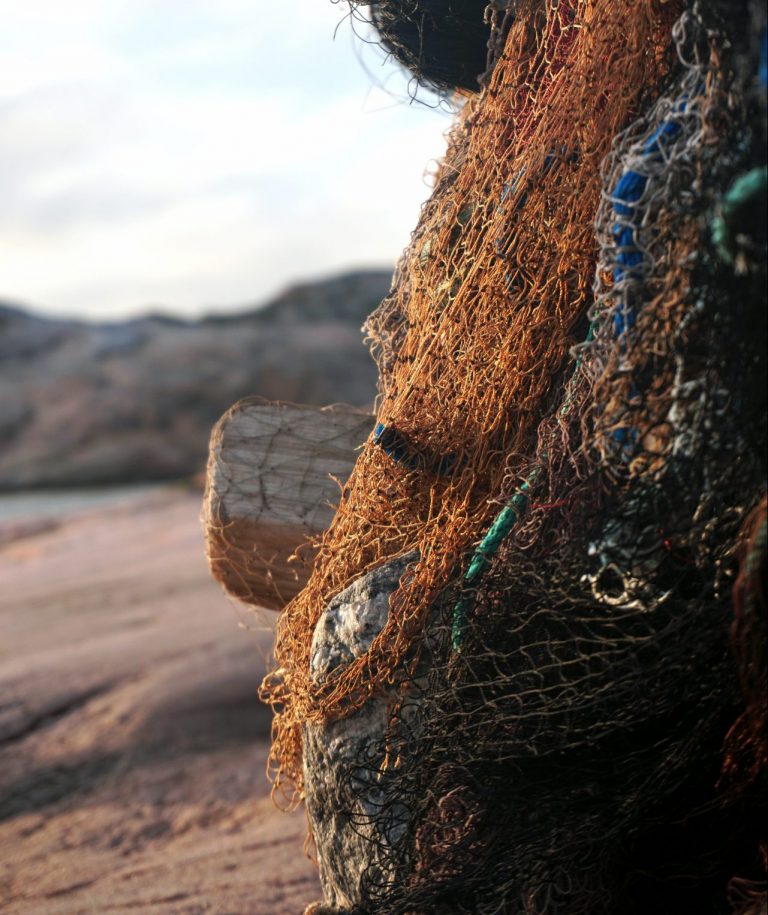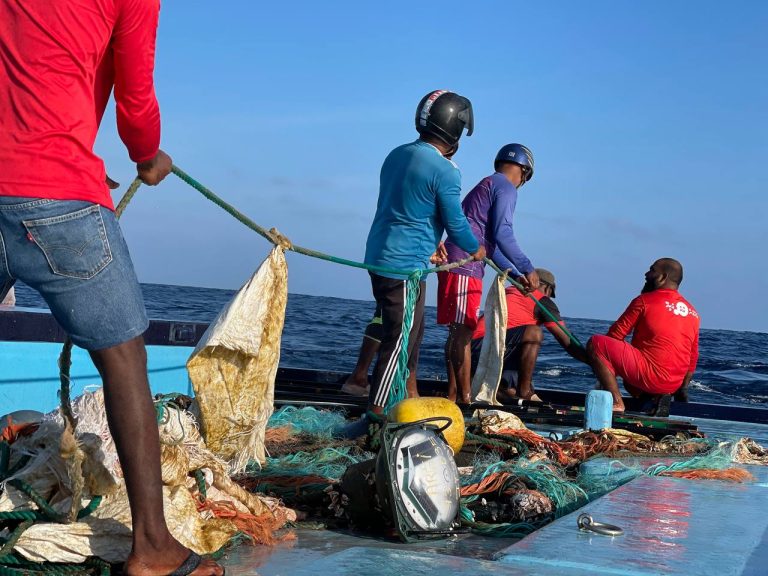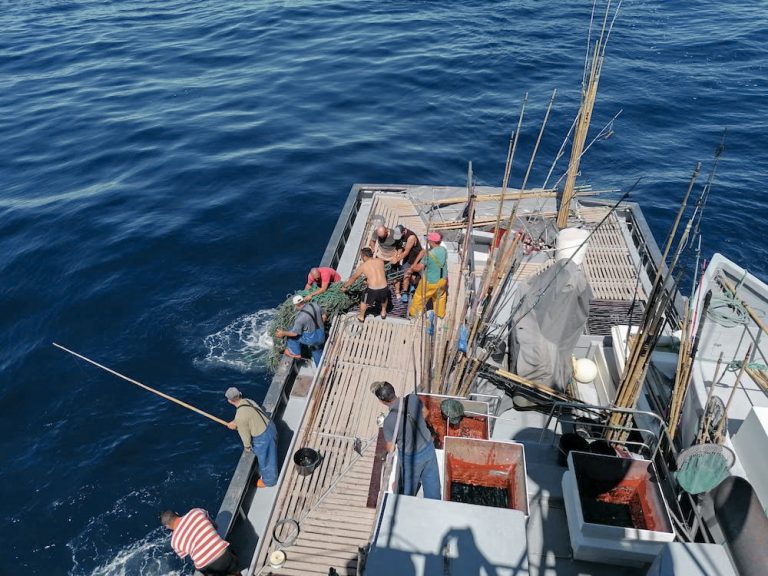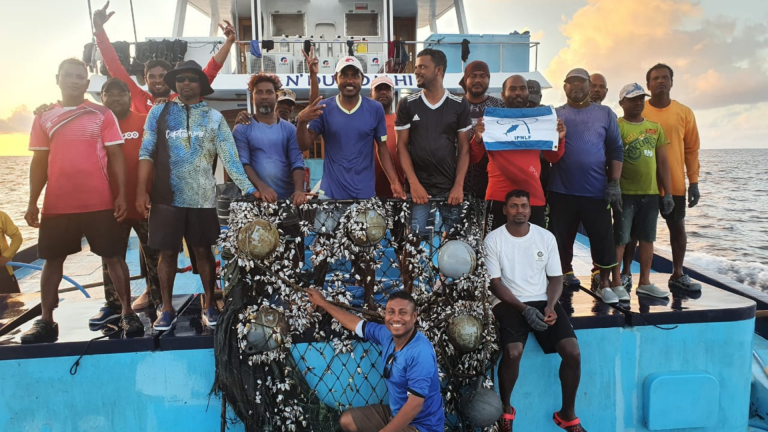These marine plastics are caused by abandonment or loss of industrial plastic fishing nets, fishing lines and fish aggregation devices (FADs). By 2025, 100% of IPNLF members publicly commit to driving transparency, social responsibility and environmental sustainability in their one-by-one supply chains. This involves the ACTION to ensure that the plastic footprint of one-by-one fisheries is further reduced and that these fisheries aim to become ‘plastic neutral’ by 2025.

Plastics plague marine life and the key to solving this crisis is to turn off the tap; we need to reduce the flow of plastic into our oceans.
One-by-one fisheries create very little plastic pollution, especially in comparison with industrial fisheries. For example, IPNLF worked with local partners in the Azores to quantify the annual weight of ALDFG produced by the Azores pole-and-line fishery in 2019. It was found that the entire fleet only loses 0.5kg of fishing gear-related litter annually. This amount is minimal in comparison to other gear types, such as longline or purse seine methods, where some fisheries are stated to have a loss rate of 90% of dFADs. Nevertheless, we recognise our role and the opportunity we have to drive change. In the fisheries that we represent, we strive to keep plastic use and accidental loss at a bare minimum. By reducing our own fisheries’ inputs and by engaging in Ghost Gear removal programs, we are able to reduce impacts on the ocean, and drive change in other fisheries as we lead by example.
A driving force behind the wave of fishing gear entering our ocean every year is a lack of accountability for those responsible. We are committed to addressing this issue and do so through the Reimagine Tuna campaign , A Truly Plastic-Neutral Fishery and our advocacy work around a Polluter Pays Principle. We advocate for a Polluter Pays Principle to be applied to drifting FAD fisheries, namely purse seine fisheries, to create accountability. This practice ensures that polluters will bear the costs of managing FAD pollution to prevent damage to human health or the environment which is currently left to coastal states.
Ethical consumers can use their purchasing power to help bring about these changes. They should demand that fisheries associated with their tuna products demonstrate that they have minimal plastic pollution impacts.

It is estimated that 10% of the plastic in the ocean comes from lost fishing gear, however, the real figure is likely to be much higher. Despite the minimal fishing gear pollution coming from one-by-one fishers, and the much lower threat that losses of these gears pose to ecosystems, we do still recognise and pursue opportunities to have our fisheries further reduce their contribution to fishing gear pollution. However, where we can’t reduce every bit of plastic in one-by-one fishing operations, we can contribute to the clean-up of our oceans and achieve plastic neutrality, which all IPNLF members have also committed to achieving by 2025.

Our Plastic Neutrality Projects focus on investing in a circular economy, developing and implementing best practices, and sharing inspiring mitigation (reduction of plastics) stories from our fleets, the fishermen, and from our members, while also advocating on a global scale for all fisheries to be held more accountable for the damage caused by their lost or abandoned fishing gears.
Recent projects include the Joanna Toole Ghost Gear Initiative in The Maldives and the Azores Ghost Gear Competition which has one-by-one tuna fisheries proudly pioneering opportunities for fishers to be the solution to plastic pollution issues. They have been collecting destructive gears, such as drifting FADs, gillnets, buoys, and marine debris that have been abandoned at sea by less responsible purse-seine fisheries operating in other areas of our shared oceans. Through minimising our own fleets inputs and resultant impacts, highlighting the scale of the problem that’s mostly driven by other fisheries, advocating for regional polluter pays mechanisms and other mitigation or accountability promoting policies, IPNLF continues to lead the charge in addressing fishing gear pollution concerns on a global scale.
IPNLF worked with local partners Azores Ocean Observatory (OMA), the Azores Fisheries Observer Program (POPA), and the Institute of Marine Research (IMAR) to quantify the annual weight of ALDFG produced by the Azores pole-and-line fishery in 2019. It was found that the entire fleet only loses 0.5kg of fishing gear-related litter annually. This amount is minimal in comparison to other gear types, such as longline or purse seine methods, but it’s crucial that all gears are held to the same environmental standard.
From this analysis, the project partners created a competition, supported by responsible brand Fish4Ever and the French retailer BioCoop France among the pole-and-line fleet to remove ALDFG and marine debris that they came across during their fishing trips and, in doing so, achieved the world’s first plastic neural fishery!
In the first year of the competition, fishers removed 875 times more plastic than they lost and, in the following year, the fleet removed 734kg of marine litter (620kg confirmed to be fishing gears) which is almost 1500 times more plastic than they lost in the same time frame. The last year was even more successful as the fleet had already matched the achievements of previous years with two months left of the competition.
To be the world’s first plastic neutral fishery is an incredible achievement. While one-by-one fisheries do not contribute significantly to oceanic plastic pollution, this project allows them to contribute solutions to some of the greatest issues our oceans and coastal communities face, and has set a new standard for best practice in the industry. It is important that polluting fisheries are now held to this same standard to help fight plastic pollution at sea and this creative solution to plastic removal can be applied to the broader industry to drive positive change ocean-wide.

We collaborate with members and their fisheries to find practical, viable solutions to prevent gear loss and replace single use plastics, such as plastic water bottles or packaging, with innovative alternatives throughout their operations.
To address plastics that can’t be reduced, we engage with local partners on land to re-purpose plastics and work with fishers to create recycling systems. We implement strict waste management protocols onboard one-by-one fishing vessels and provide training for fishers on how to prevent gear loss or plastic discharge into the sea from boats. We then work with port authorities to help facilitate appropriate reception facilities ashore.